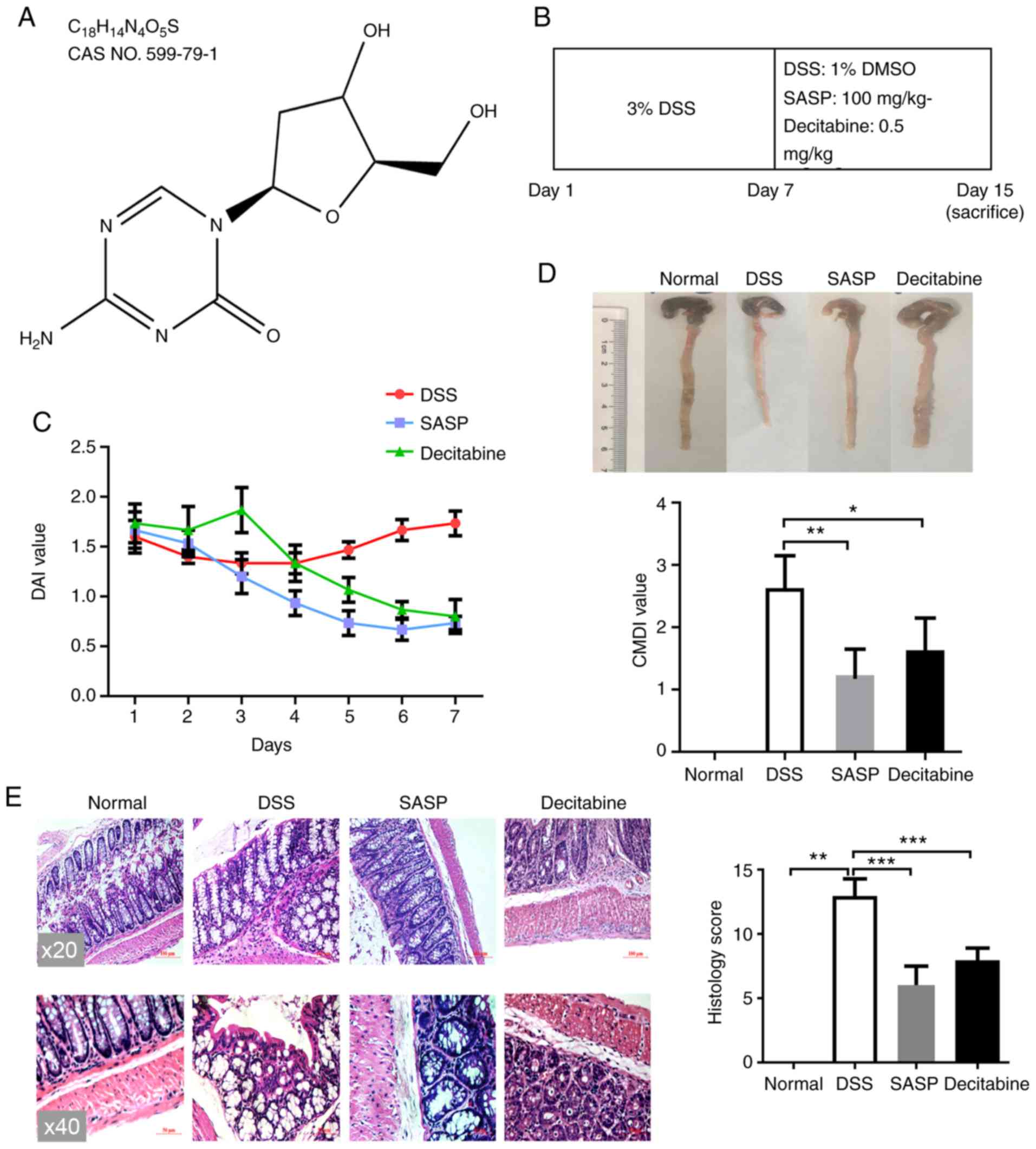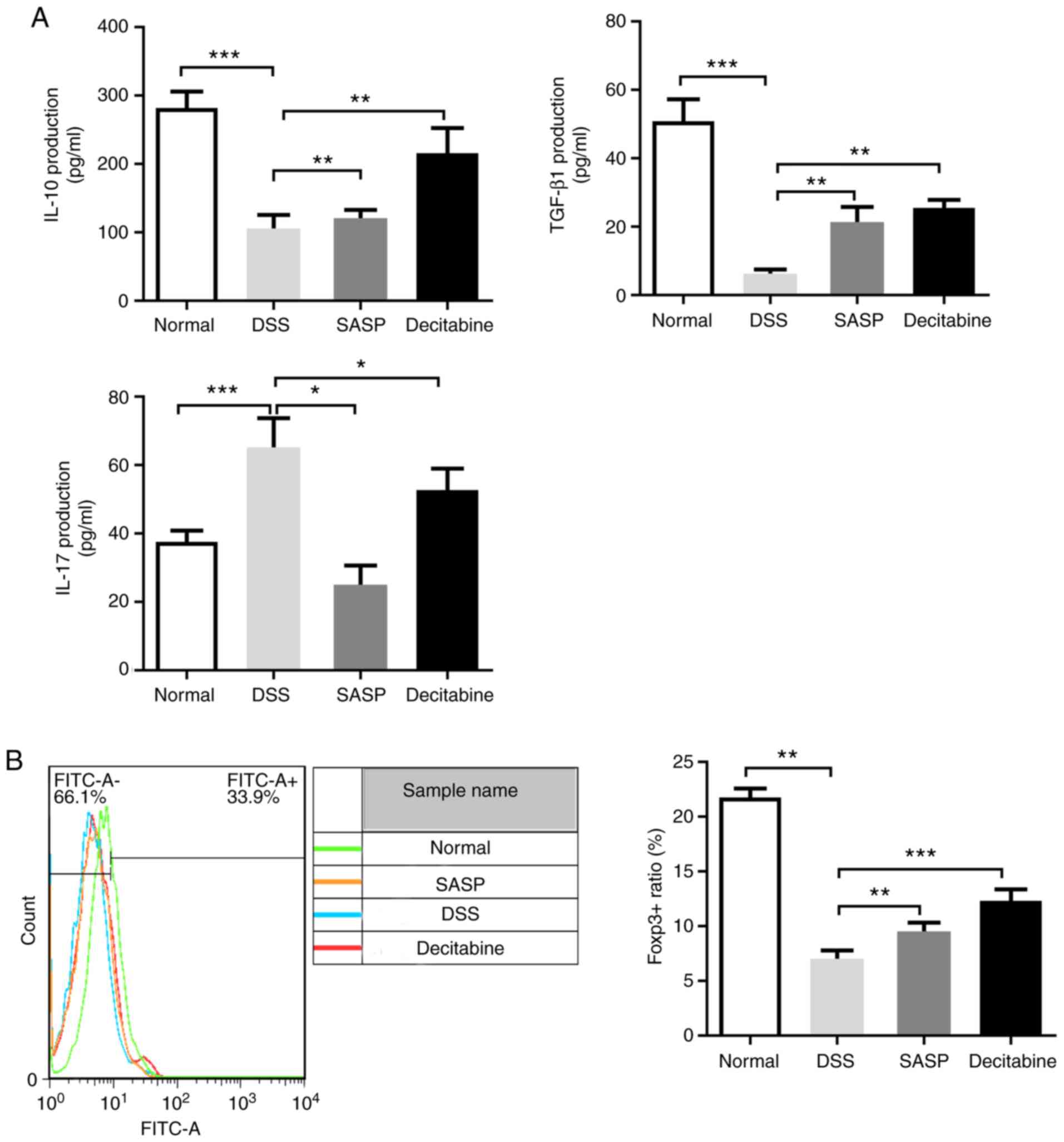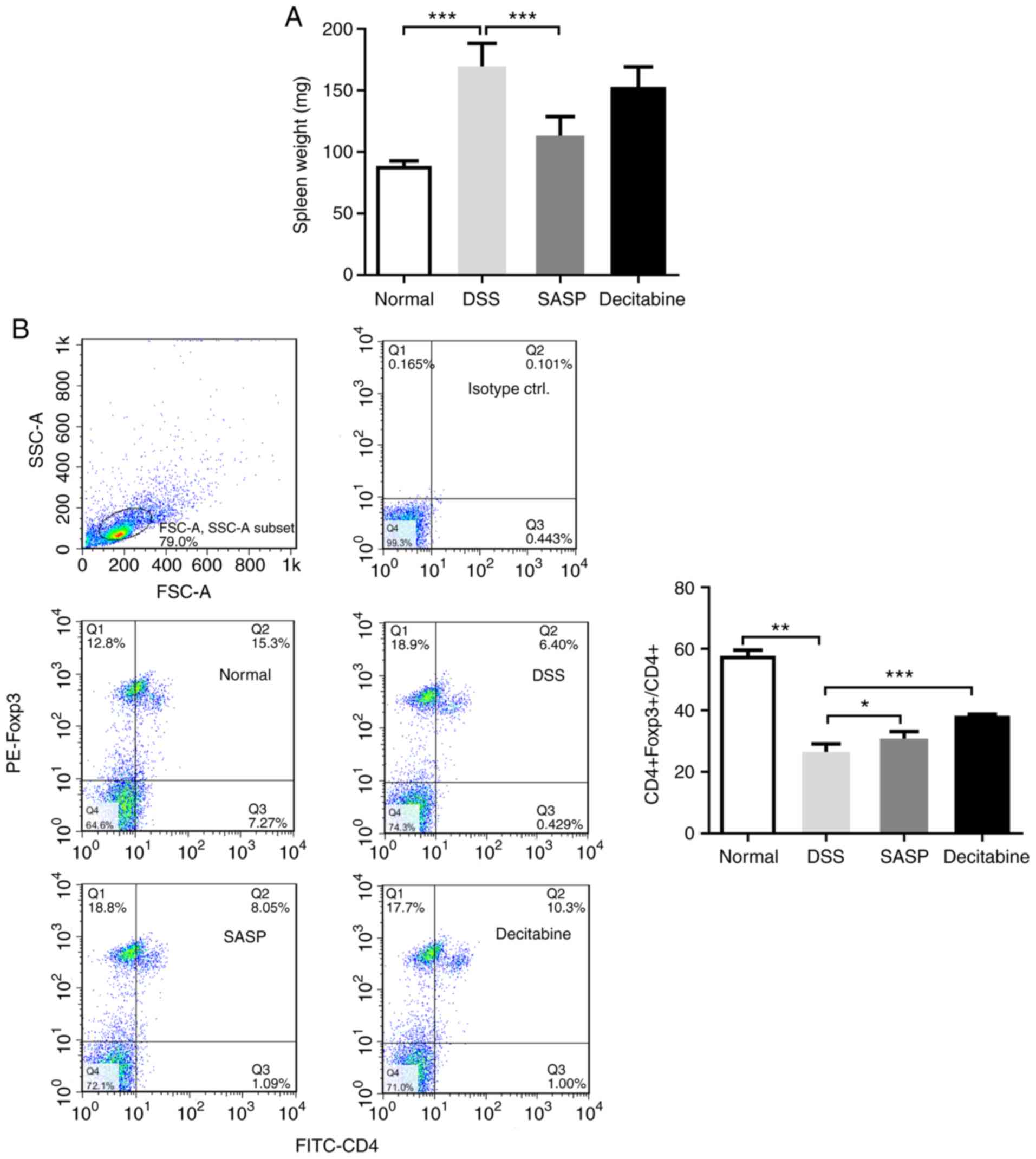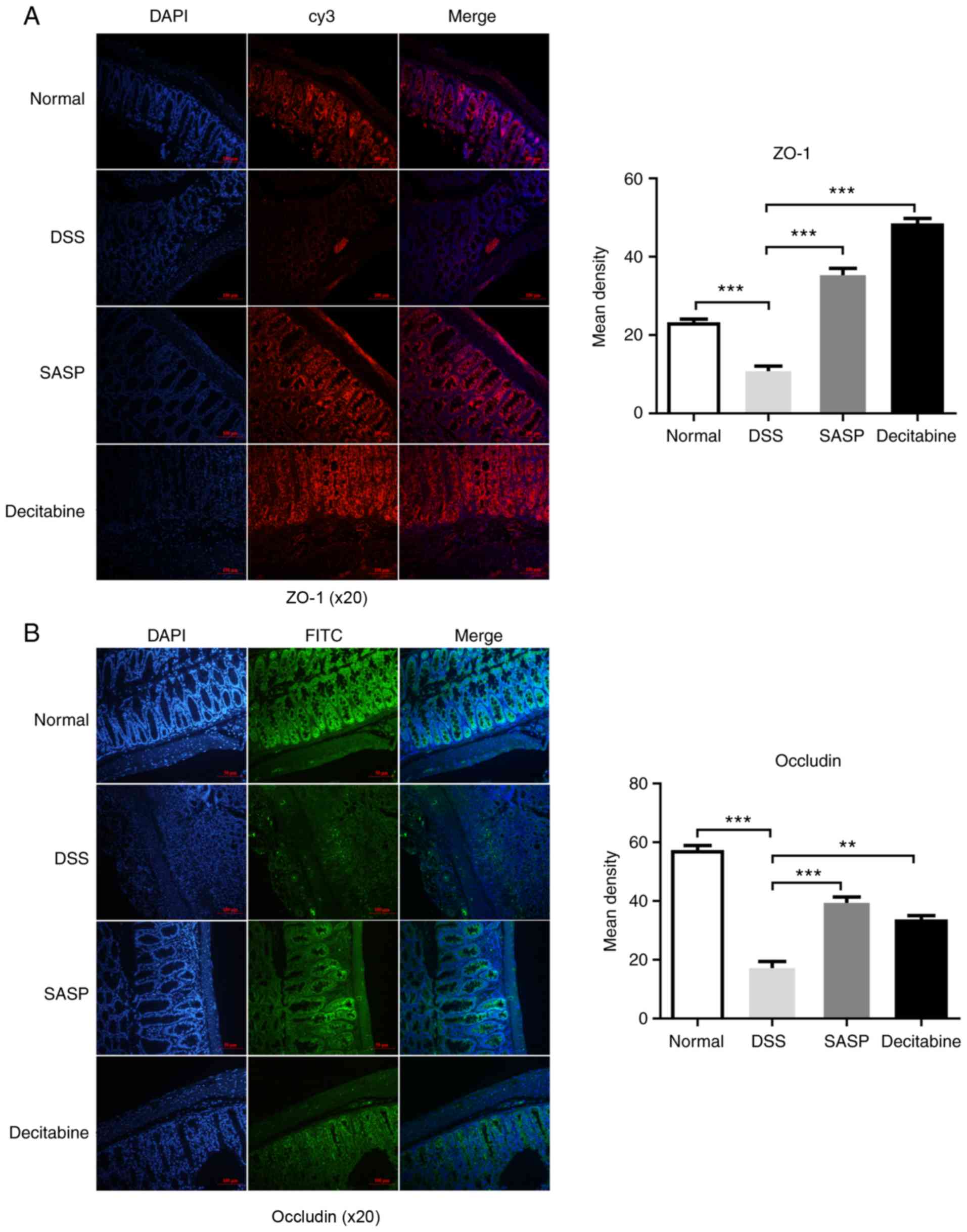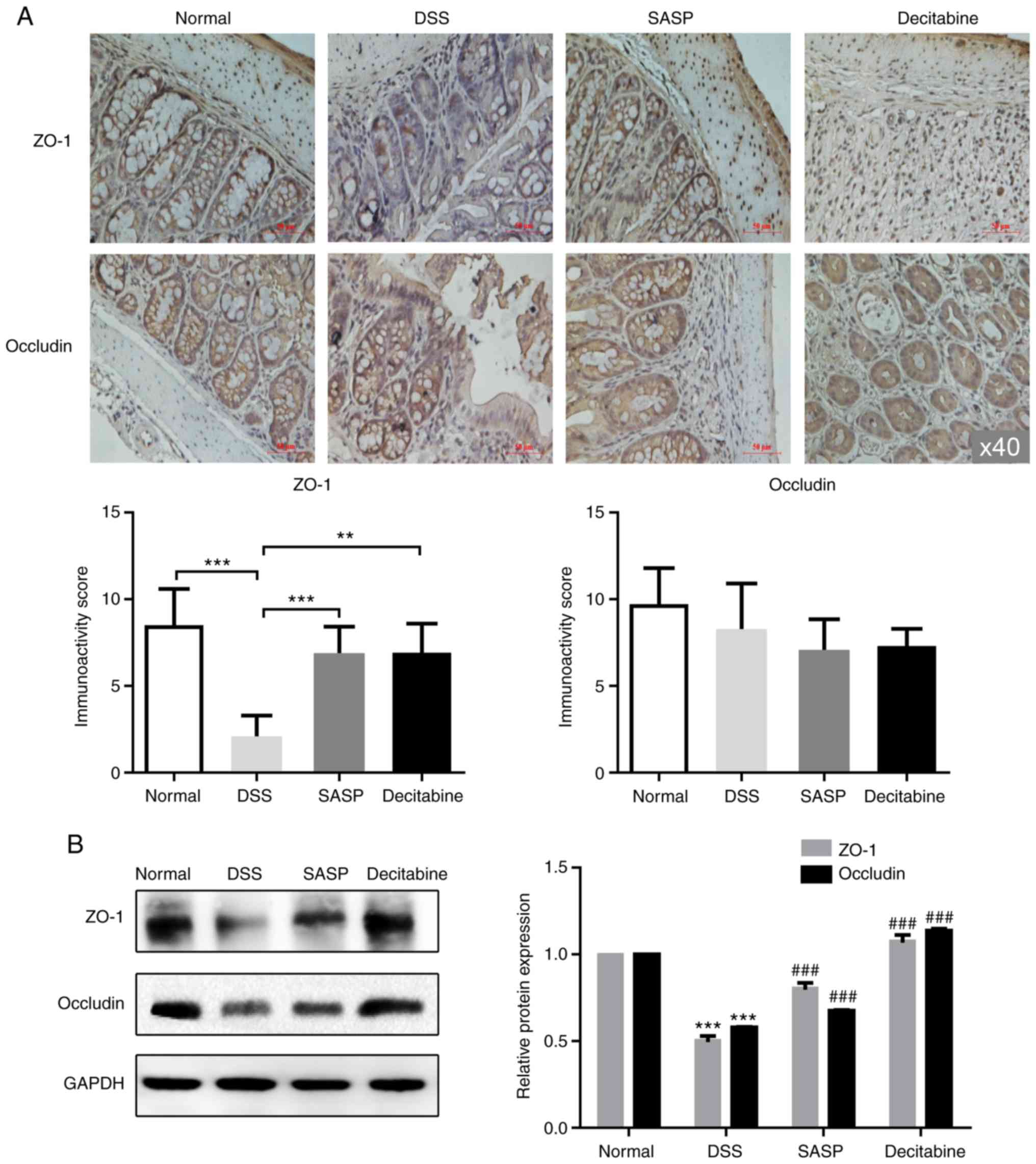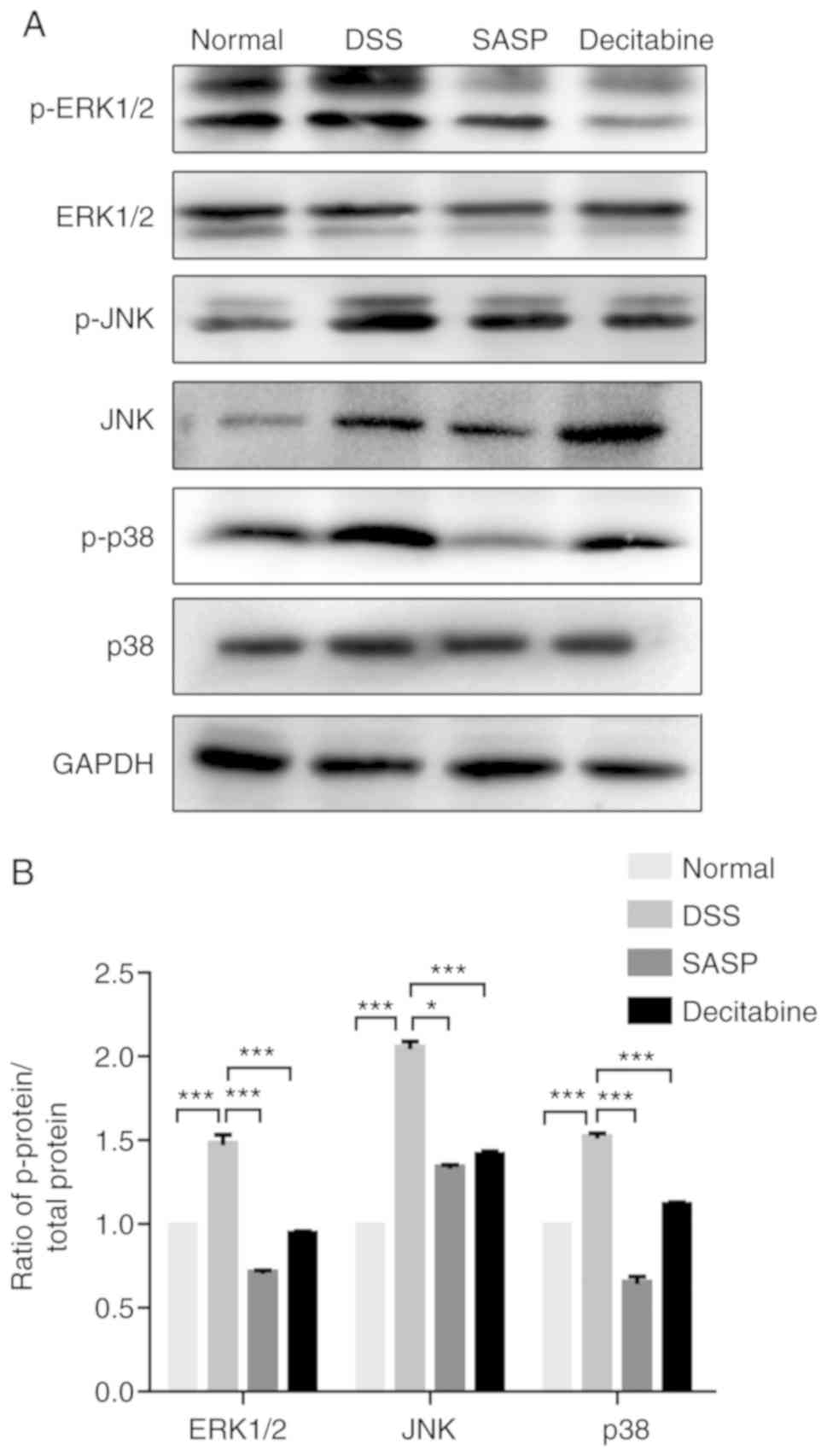|
1
|
Yu SM and Kim SJ: 5-Azacytidine regulates
matrix metalloproteinase-9 expression, and the migration and
invasion of human fibrosarcoma HT1080 cells via PI3-kinase and
ERK1/2 pathways. Int J Oncol. 49:1241–1247. 2016. View Article : Google Scholar : PubMed/NCBI
|
|
2
|
Woo JK, Choi S, Kang JH, Kim DE, Hurh BS,
Jeon JE, Kim SY and Oh SH: BMC Complement Altern Med. 16:4982016.
View Article : Google Scholar
|
|
3
|
Kim MW, Choi S, Kim SY, Yoon YS, Kang JH
and Oh SH: Allyl isothiocyanate ameliorates dextran sodium
sulfate-induced colitis in mouse by enhancing tight junction and
mucin expression. Int J Mol Sci. 19:E20252018. View Article : Google Scholar : PubMed/NCBI
|
|
4
|
Hartnett L and Egan LJ: Inflammation, DNA
methylation and colitis-associated cancer. Carcinogenesis.
33:723–731. 2012. View Article : Google Scholar : PubMed/NCBI
|
|
5
|
Molodecky NA, Soon IS, Rabi DM, Ghali WA,
Ferris M, Chernoff G, Benchimol EI, Panaccione R, Ghosh S, Barkema
HW and Kaplan GG: Increasing incidence and prevalence of the
inflammatory bowel diseases with time, based on systematic review.
Gastroenterology. 142:46–54e42. 2012. View Article : Google Scholar
|
|
6
|
Ramos GP and Papadakis KA: Mechanisms of
disease: Inflammatory bowel diseases. Mayo Clin Proc. 94:155–165.
2019. View Article : Google Scholar : PubMed/NCBI
|
|
7
|
Scarpa M, Scarpa M, Castagliuolo I, Erroi
F, Kotsafti A, Basato S, Brun P, D'Incà R, Rugge M, Angriman I and
Castoro C: Aberrant gene methylation in non-neoplastic mucosa as a
predictive marker of ulcerative colitis-associated CRC. Oncotarget.
7:10322–10331. 2016. View Article : Google Scholar : PubMed/NCBI
|
|
8
|
Harris RA, Nagy-Szakal D, Mir SA, Frank E,
Szigeti R, Kaplan JL, Bronsky J, Opekun A, Ferry GD, Winter H and
Kellermayer R: DNA methylation-associated colonic mucosal immune
and defense responses in treatment-naive pediatric ulcerative
colitis. Epigenetics. 9:1131–1137. 2014. View Article : Google Scholar : PubMed/NCBI
|
|
9
|
Müller S, Fritz Y and Wagenknecht HA:
Control of energy transfer between pyrene- and perylene-nucleosides
by the sequence of DNA-templated supramolecular assemblies.
ChemistryOpen. 9:389–392. 2020. View Article : Google Scholar : PubMed/NCBI
|
|
10
|
Hollenbach PW, Nguyen AN, Brady H,
Williams M, Ning Y, Richard N, Krushel L, Aukerman SL, Heise C and
MacBeth KJ: A comparison of azacitidine and decitabine activities
in acute myeloid leukemia cell lines. PLoS One. 5:e90012010.
View Article : Google Scholar : PubMed/NCBI
|
|
11
|
Lu CH, Wu CJ, Chan CC, Nguyen DT, Lin KR,
Lin SJ, Chen LC, Yen JJ and Kuo ML: DNA methyltransferase inhibitor
promotes human CD4(+)CD25(h)FOXP3(+) regulatory T lymphocyte
induction under suboptimal TCR stimulation. Front Immunol.
7:488eCollection 2016. 2016. View Article : Google Scholar
|
|
12
|
Vargas-Robles H, Castro-Ochoa KF,
Citalán-Madrid AF and Schnoor M: Beneficial effects of nutritional
supplements on intestinal epithelial barrier functions in
experimental colitis models in vivo. World J Gastroenterol.
25:4181–4198. 2019. View Article : Google Scholar : PubMed/NCBI
|
|
13
|
Sann H, Erichsen J, Hessmann M, Pahl A and
Hoffmeyer A: Efficacy of drugs used in the treatment of IBD and
combinations thereof in acute DSS-induced colitis in mice. Life
Sci. 92:708–718. 2013. View Article : Google Scholar : PubMed/NCBI
|
|
14
|
Andújar I, Recio MC, Giner RM,
Cienfuegos-Jovellanos E, Laghi S, Muguerza B and Ríos JL:
Inhibition of ulcerative colitis in mice after oral administration
of a polyphenol-enriched cocoa extract is mediated by the
inhibition of STAT1 and STAT3 phosphorylation in colon cells. J
Agric Food Chem. 59:6474–6483. 2011. View Article : Google Scholar : PubMed/NCBI
|
|
15
|
Nishiyama Y, Kataoka T, Yamato K, Taguchi
T and Yamaoka K: Suppression of dextran sulfate sodium-induced
colitis in mice by radon inhalation. Mediators Inflamm.
2012:2396172012. View Article : Google Scholar
|
|
16
|
Samak G, Chaudhry KK, Gangwar R, Narayanan
D, Jaggar JH and Rao R: Calcium/Ask1/MKK7/JNK2/c-Src signalling
cascade mediates disruption of intestinal epithelial tight
junctions by dextran sulfate sodium. Biochem J. 465:503–515. 2015.
View Article : Google Scholar :
|
|
17
|
Qin J, Yu B, Moyer AM, Nowsheen S, Liu T,
Qin S, Zhuang Y, Liu D, Lu SW, Kalari KR, et al: DNA
methyltransferase expression in triple-negative breast cancer
predicts sensitivity to decitabine. J Clin Invest. 128:2376–2388.
2018. View
Article : Google Scholar : PubMed/NCBI
|
|
18
|
Kantarjian H, Issa PJ, Rosenfeld CS,
Bennett JM, Albitar M, DiPersio J, Klimek V, Slack J, de Castro C,
Ravandi F, et al: Decitabine improves patient outcomes in
myelodysplastic Syndromes: Results of a phase III randomized study.
Cancer. 106:1794–1803. 2006. View Article : Google Scholar : PubMed/NCBI
|
|
19
|
Cheung MC, Spalding PB, Gutierrez JC,
Balkan W, Namias N, Koniaris LG and Zimmers TA: Body surface area
prediction in normal, hypermuscular, and obese mice. J Surg Res.
153:326–331. 2009. View Article : Google Scholar
|
|
20
|
Jansen YJL, Verset G, Schats K, Van Dam
PJ, Seremet T, Kockx M, Van Laethem JB and Neyns B: Phase I
clinical trial of decitabine (5-aza2′-deoxycytidine) administered
by hepatic arterial infusion in patients with unresectable
liver-predominant metastases. ESMO Open. 4:e0004642019. View Article : Google Scholar
|
|
21
|
Sakaguchi S, Miyara M, Costantino CM and
Hafler DA: FOXP3+ regulatory T cells in the human immune system.
Nat Rev Immunol. 10:490–500. 2010. View Article : Google Scholar : PubMed/NCBI
|
|
22
|
Danikowski KM, Jayaraman S and Prabhakar
BS: Regulatory T cells in multiple sclerosis and myasthenia gravis.
J Neuroinflammation. 14:1172017. View Article : Google Scholar : PubMed/NCBI
|
|
23
|
Nunes NS, Kim S, Sundby M, Chandran P,
Burks SR, Paz AH and Frank JA: Temporal clinical, proteomic,
histological and cellular immune responses of dextran sulfate
sodium-induced acute colitis. World J Gastroenterol. 24:4341–4355.
2018. View Article : Google Scholar : PubMed/NCBI
|
|
24
|
Furumoto Y, Nunomura S, Terada T, Rivera J
and Ra C: The FcepsilonRIbeta immunoreceptor tyrosine-based
activation motif exerts inhibitory control on MAPK and IkappaB
kinase phosphorylation and mast cell cytokine production. J Biol
Chem. 279:49177–49187. 2004. View Article : Google Scholar : PubMed/NCBI
|
|
25
|
Marchesi N, Thongon N, Pascale A,
Provenzani A, Koskela A, Korhonen E, Smedowski A, Govoni S,
Kauppinen A, Kaarniranta K and Amadio M: Autophagy stimulus
promotes early hur protein activation and p62/SQSTM1 protein
synthesis in ARPE-19 cells by triggering Erk1/2, p38(MAPK), and JNK
kinase pathways. Oxid Med Cell Longev. 2018:4956080. 2018.
View Article : Google Scholar
|
|
26
|
Munkholm P: The incidence and prevalence
of colorectal cancer in inflammatory bowel disease. Aliment
Pharmacol Ther. 18:1–5. 2003. View Article : Google Scholar
|
|
27
|
Hou H, Cao R, Quan M, Sun Y, Sun H, Zhang
J, Li B, Guo L and Song X: Rapamycin and fingolimod modulate
Treg/Th17 cells in experimental autoimmune encephalomyelitis by
regulating the Akt-mTOR and MAPK/ERK pathways. J Neuroimmunol.
324:26–34. 2018. View Article : Google Scholar : PubMed/NCBI
|
|
28
|
Wu CJ, Yang CY, Chen YH, Chen CM, Chen LC
and Kuo ML: The DNA methylation inhibitor 5-azacytidine increases
regulatory T cells and alleviates airway inflammation in
oval-bumin-sensitized mice. Int Arch Allergy Immunol. 160:356–364.
2013. View Article : Google Scholar
|
|
29
|
Smids C, Horjus Talabur, Horje CS,
Drylewicz J, Drylewicz J, Roosenboom B, Groenen MJM, van Koolwijk
E, van Lochem EG and Wahab PJ: Intestinal T cell profiling in
inflammatory bowel disease: Linking T cell subsets to disease
activity and disease course. J Crohns Colitis. 12:465–475. 2018.
View Article : Google Scholar
|
|
30
|
Kaskow BJ and Baecher-Allan C: Effector T
cells in multiple sclerosis. Cold Spring Harb Perspect Med.
8:a0290252018. View Article : Google Scholar : PubMed/NCBI
|
|
31
|
Ruitenberg EJ and Elgersma A: Response of
intestinal globule leucocytes in the mouse during a Trichinella
spiralis infection and its independence of intestinal mast cells.
Br J Exp Pathol. 60:246–251. 1979.PubMed/NCBI
|
|
32
|
Fitzpatrick LR: Inhibition of IL-17 as a
pharmacological approach for IBD. Int Rev Immunol. 32:544–555.
2013. View Article : Google Scholar : PubMed/NCBI
|
|
33
|
Jacquemin C, Augusto JF, Scherlinger M,
Gensous N, Forcade E, Douchet I, Levionnois E, Richez C, Lazaro E,
Duffau P, et al: OX40L/OX40 axis impairs follicular and natural
Treg function in human SLE. JCI Insight. 3:1221672018. View Article : Google Scholar : PubMed/NCBI
|
|
34
|
Landman S, Cruijsen M, Urbano PCM, Huls G,
van Erp PEJ, van Rijssen E, Joosten I and Koenen HJPM: DNA
methyltransferase inhibition promotes th1 polarization in human
CD4(+) CD25(high) FOXP3(+) regulatory T cells but does not affect
their suppressive capacity. J Immunol Res. 2018:49739642018.
View Article : Google Scholar
|
|
35
|
Fedorak RN, Gangl A, Elson CO, Rutgeerts
P, Schreiber S, Wild G, Hanauer SB, Kilian A, Cohard M, LeBeaut A
and Feagan B: Recombinant human interleukin 10 in the treatment of
patients with mild to moderately active Crohn's disease. The
Interleukin 10 Inflammatory Bowel Disease Cooperative Study Group.
Gastroenterology. 119:1473–1482. 2000. View Article : Google Scholar : PubMed/NCBI
|
|
36
|
Polansky JK, Kretschmer K, Freyer J,
Floess S, Garbe A, Baron U, Olek S, Hamann A, von Boehmer H and
Huehn J: DNA methylation controls Foxp3 gene expression. Eur J
Immunol. 38:1654–1663. 2008. View Article : Google Scholar : PubMed/NCBI
|
|
37
|
Kehrmann J, Tatura R, Zeschnigk M,
Probst-Kepper M, Geffers R, Steinmann J and Buer J: Impact of
5-aza-2′-deoxycytidine and epigallocatechin-3-gallate for induction
of human regulatory T cells. Immunology. 142:384–395. 2014.
View Article : Google Scholar : PubMed/NCBI
|
|
38
|
Jabbour E, Issa JP, Garcia-Manero G and
Kantarjian H: Evolution of decitabine development: Accomplishments,
ongoing investigations, and future strategies. Cancer.
112:2341–2351. 2008. View Article : Google Scholar : PubMed/NCBI
|
|
39
|
Duan L, Rao X, Braunstein Z, Toomey AC and
Zhong J: Role of incretin axis in inflammatory bowel disease. Front
Immunol. 8:17342017. View Article : Google Scholar : PubMed/NCBI
|
|
40
|
Cui Y, Hu Q, Gu Y, Sheng L, Wu K, Shi J,
Tan Y, Fu H, Liu L, Fu S, et al: Decitabine facilitates the
generation and immunosuppressive function of regulatory gammadeltaT
cells derived from human peripheral blood mononuclear cells.
Leukemia. 27:1580–1585. 2013. View Article : Google Scholar
|
|
41
|
Granet C and Miossec P: Combination of the
pro-inflammatory cytokines IL-1, TNF-alpha and IL-17 leads to
enhanced expression and additional recruitment of AP-1 family
members, Egr-1 and NF-kappaB in osteoblast-like cells. Cytokine.
26:169–177. 2004. View Article : Google Scholar : PubMed/NCBI
|
|
42
|
Gizinski AM, Fox DA and Sarkar S:
Pharmacotherapy: Concepts of pathogenesis and emerging treatments.
Co-stimulation and T cells as therapeutic targets. Best Pract Res
Clin Rheumatol. 24:463–477. 2010. View Article : Google Scholar : PubMed/NCBI
|
|
43
|
Brinkhoff A, Sieberichs A, Engler H, Dolff
S, Benson S, Korth J, Schedlowski M, Kribben A, Witzke O and Wilde
B: Pro-Inflammatory Th1 and Th17 cells are suppressed during human
experimental endotoxemia whereas anti-inflammatory IL-10 producing
T-cells are unaffected. Front Immunol. 9:11332018. View Article : Google Scholar : PubMed/NCBI
|
|
44
|
Awad WA, Hess C and Hess M: Enteric
pathogens and their toxin-induced disruption of the intestinal
barrier through alteration of tight junctions in chickens. Toxins
(Basel). 9. pp. E602017, View Article : Google Scholar
|
|
45
|
Okumura R and Takeda K: Roles of
intestinal epithelial cells in the maintenance of gut homeostasis.
Exp Mol Med. 49:e3382017. View Article : Google Scholar : PubMed/NCBI
|
|
46
|
Parikh K, Antanaviciute A, Fawkner-Corbett
D, Jagielowicz M, Aulicino A, Lagerholm C, Davis S, Kinchen J, Chen
HH, Alham NK, et al: Colonic epithelial cell diversity in health
and inflammatory bowel disease. Nature. 567:49–55. 2019. View Article : Google Scholar : PubMed/NCBI
|
|
47
|
O'Callaghan AA and Corr SC: Establishing
boundaries: The relationship that exists between intestinal
epithelial cells and gut-dwelling bacteria. Microorganisms.
7:E6632019. View Article : Google Scholar : PubMed/NCBI
|
|
48
|
Vanhove W, Nys K, Arijs I, Cleynen I,
Noben M, De Schepper S, Van Assche G, Ferrante M and Vermeire S:
Biopsy-derived intestinal epithelial cell cultures for
pathway-based stratification of patients with inflammatory bowel
disease. J Crohns Colitis. 12:178–187. 2018. View Article : Google Scholar
|
|
49
|
Setia S, Nehru B and Sanyal SN:
Upregulation of MAPK/Erk and PI3K/Akt pathways in ulcerative
colitis-associated colon cancer. Biomed Pharmacother. 68:1023–1029.
2014. View Article : Google Scholar : PubMed/NCBI
|
|
50
|
Wagner EF and Nebreda AR: Signal
integration by JNK and p38 MAPK pathways in cancer development. Nat
Rev Cancer. 9:537–549. 2009. View Article : Google Scholar : PubMed/NCBI
|
|
51
|
You BH, Chae HS, Song J, Ko HW, Chin YW
and Choi YH: α-Mangostin ameliorates dextran sulfate sodium-induced
colitis through inhibition of NF-κB and MAPK pathways. Int
Immunopharmacol. 49:212–221. 2017. View Article : Google Scholar : PubMed/NCBI
|
|
52
|
Shematorova EK, Shpakovski DG, Chernysheva
AD and Shpakovski GV: Molecular mechanisms of the juvenile form of
batten disease: Important role of MAPK signaling pathways
(ERK1/ERK2, JNK and p38) in pathogenesis of the malady. Biol
Direct. 13:192018. View Article : Google Scholar
|
|
53
|
Zhao HM, Huang XY, Zhou F, Tong WT, Wan
PT, Huang MF, Ye Q and Liu DY: Si shen wan inhibits mRNA expression
of apoptosis-related molecules in p38 MAPK signal pathway in mice
with colitis. Evid Based Complement Alternat Med. 2013:4320972013.
View Article : Google Scholar : PubMed/NCBI
|















